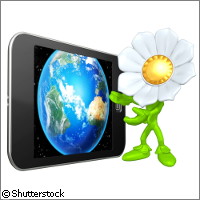EU project targets 4G telecom energy savings
The EU is committing more than EUR 9.5 million to a research-business consortium's drive to reduce the energy consumption of 4th Generation (4G) mobile wireless communication networks. The EARTH ('Energy aware radio and network technologies') project is funded under the 'Information and communication technologies' (ICT) Theme of the EU's Seventh Framework Programme (FP7). The EARTH consortium, which is made up of top academic institutions, telecommunications service providers and component and infrastructure vendors, hopes to slash energy consumption by 50% between now and 2012. The project aims to cut carbon dioxide (CO2) emissions in the ICT sector and facilitate the implementation of environmentally sustainable broadband wireless services. The team will also play a key role in making European and international broadband infrastructures widely available in both existing and emerging markets. The project partners say they will tackle the challenge by focusing on the energy efficiency of mobile networks at a comprehensive system level instead of assessing discrete network elements. They say that their approach will enable them to clinch energy savings in wireless network areas, as well as in the networks' components and radio interfaces. Their work will result in the development of a new generation of energy-efficient network equipment and components. The EARTH partners will also shape deployment strategies that target better efficiency, and determine optimal energy-aware network management solutions. The EARTH project is part of the EU's 'Network of the Future' initiative, which seeks to break down the structural limitations of the existing internet architecture - currently the infrastructure struggles to support so many applications and services for which it was simply not designed. Ultimately, the Network of the Future will make the new generation of telecom infrastructure, network and internet technologies a reality, which in turn will lead to greater support for governments and various sectors including environment, transport, health and education. 'What makes EARTH so compelling is that it has the potential to deliver tangible benefits to society on a number of levels; reducing energy consumption of networks and their impact on environment, while making broadband wireless service available to a greater number of people in Europe,' said Dr Rainer Fechner, head of Bell Labs in Germany and a member of the management board of Alcatel-Lucent Deutschland, coordinator of EARTH. 'The value of our contribution derives from deep experience and innovations in both green technology and advanced wireless systems.' The EARTH project brings together experts from Ericsson (Sweden), Ericsson Kommunikacios Rendszerek Kft (Hungary), Budapest University of Technology and Economics (Hungary), the University of Oulu (Finland), NXP Semiconductors (France), DOCOMO Communications Laboratories Europe GmbH (Germany), Telecom Italia S.p.A. the University of Surrey (UK), Dresden University of Technology (Germany), Interuniversitair micro-electronica centrum vzw (IMEC - Belgium), the Technical University of Lisbon (Portugal), TTI Norte SL (Spain), the European Telecommunications Standards Institute (ETSI) and the French Atomic Energy Commission (CEA).
Countries
Belgium, Germany, Finland, France, Hungary, Portugal, Sweden, United Kingdom



